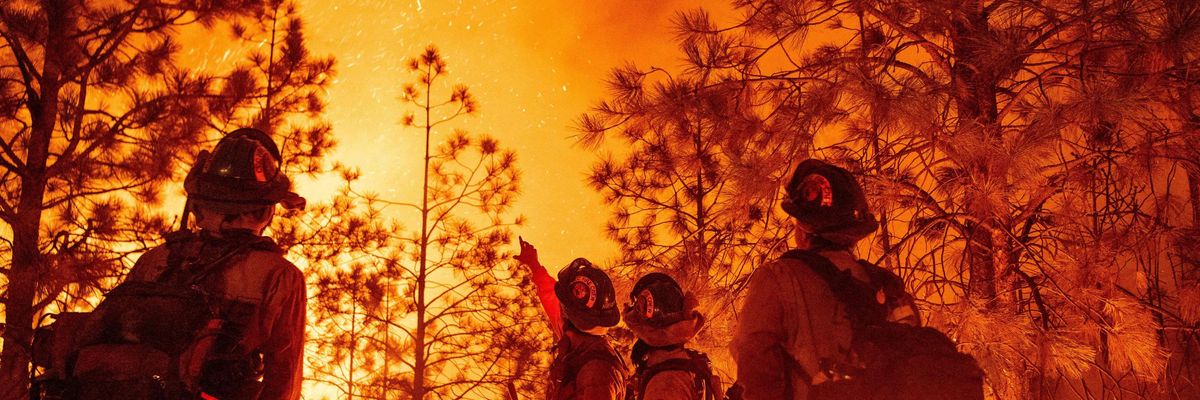In October, Nigeria, with over 600 dead and close to 1.5 million displaced, joined a growing list of nations, including Pakistan, Thailand, and Australia, that have recently experienced unprecedented flooding linked to climate change.
Unlike the transition to zero-carbon energy--already the cheapest form of energy in the world--our next challenges will be hugely expensive and politically charged, pushing humanity's limits.
Floods, droughts, wildfires, heat waves, and hurricanes like Fiona and Ian are happening more frequently and intensely, and the cumulative impacts are becoming more devastating. With the passage of the Inflation Reduction Act in late summer, a political miracle occurred, as just weeks earlier virtually no one thought such a sweeping and comprehensive climate bill would make it to President Biden's desk. This new law, in conjunction with climate spending in last year's bipartisan infrastructure act and the CHIPS and Science Act, put the United States on track to become a world leader in efforts to decarbonize the global economy.
However, the climate benefits of these legislative victories will likely not be realized by anyone alive today. This is why the IRA is bittersweet; most of the beneficiaries are future generations whose climate may start to cool and return to normal levels of atmospheric chemistry sometime in the twenty-second century. Meanwhile, the climate emergency will get progressively worse as the law came decades too late to reverse the warming trends of this century, as documented by the National Oceanic and Atmospheric Administration and other government agencies.
Ongoing not-so-natural disasters that have shocked the world these past few years--from Oregon, Puerto Rico, and Florida to France, South Africa and China--have brought the climate emergency fully into the present. And we're about to hit the long-warned of "tipping points," where even small additional change leads to abrupt and irreversible impacts.
That means that, unlike the transition to zero-carbon energy--including wind, solar and hydro-- which is already the cheapest form of energy in the world, our next challenges will be hugely expensive and politically charged, pushing humanity's limits.
First off, the moral and practical imperative for wealthier countries to provide financial support to poorer countries to assist with climate adaptation and disaster response is going to be tremendous. And getting the rich world to pay large sums of aid on an annual basis for years and decades to come is going to be hard to sustain and explain. The wealthiest nations, which have received almost all the benefits from carbon-based energy over these past two centuries, still haven't met their first $100 billion commitment laid out in the 2015 Paris Agreement.
And developing countries are taking note, with the twenty most vulnerable to climate catastrophe already threatening to stop debt payments. Their logic is compelling: why should they continue to repay debt to the developed world when it is the unchecked carbon emissions of the wealthy nations that have imposed so many climate costs on them, sending them further into debt?
The damage from climate change is likely to overwhelm the limited administrative and financial capacity of many poorer countries, creating new unstable regions according to the World Economic Forum, and increasing the prospect of armed conflicts. Some of these states, such as Pakistan with its recent massive flooding attributed to climate change, have nuclear weapons, so their stability is of paramount importance. The temptation by some bad actors to use strategic natural assets, such as control of water supplies or navigational chokepoints in climate negotiations, may also become overwhelming. We've already seen what this could look like with Russia's suspected sabotaging of the Nord Stream pipeline, sending a huge plume of methane--a very potent greenhouse gas--into the atmosphere.
Finally, the stresses on the natural world from all this climactic chaos are going to force much of humanity to radically change its behavior in everything from how we travel to what we eat, to where we live. Not all the news is bad, however, as clean energy will save millions of lives from particulate pollution and bring cheap electricity to the poor.
The expansion of "green infrastructure" and nature-based solutions, such as restoration of forests and salt marshes, will not only reduce the impact of storm surges and floods, but also bring back wildlife, including bees, bats, birds, and other pollinators vital to our food supplies. Still, some of these changes will be wrenching and fiercely resisted, especially as many people seek to hold onto their homes in areas that become increasingly uninhabitable. We see this at home too, as residents are already starting to rebuild in the areas just devastated by Hurricane Ian in Florida.
As we enter this next phase, Americans should rejoice at the recent legislative victories and the momentum they provide, but we should also prepare for the much harder battles ahead. There will not be any easy legislative or technological fixes for the dislocations and stresses that are coming our way.
Rightwing movements and leaders are already exploiting climate chaos for political gain, arguing for example that it's not the role of government to enforce mandatory evacuation orders, and their efforts will only become more strident. We must be ready to fight on many fronts--cultural, practical, and political--while realizing that much of our effort is for the benefit of our youngest children, grandchildren, and those not yet born.
We have already burned so much fossil fuel that the twenty-first century will be defined as "the greenhouse century." And yet, we can and must continue to transition and find ways to pull carbon dioxide out of the atmosphere in the hope that humanity emerges from the wreckage ready to build a more just world.

